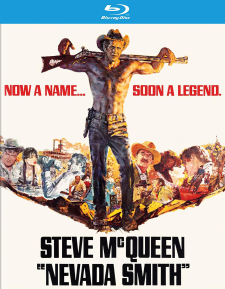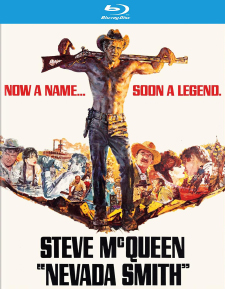Nevada Smith (Blu-ray Review)

Director
Henry HathawayRelease Date(s)
1966 (July 18, 2023)Studio(s)
Paramount Pictures (Kino Lorber Studio Classics)- Film/Program Grade: B+
- Video Grade: A-
- Audio Grade: A
- Extras Grade: B
Review
A prequel to The Carpetbaggers (1964), which is likewise being released to Blu-ray later this year by Kino, Nevada Smith (1966) is a sprawling, multi-star film toplined by Steve McQueen. A transitional Western directed by Henry Hathaway, it fuses classical genre components with a revenge storyline that’s violent for the time that anticipates later ‘70s films of the type that often starred Charles Bronson. The plot is too simplistic to justify its 131-minute running time yet, conversely, the story also introduces so many characters and locations that the basic idea might have been better served as a television mini-series. Big name stars and settings come and go so quickly that, outside of McQueen, most are limited to a short scene or two. Second-billed Karl Malden, for instance, appears fleetingly in the first five minutes but doesn’t return until about an hour and fifty minutes into the picture.
In this sense, Nevada Smith is a lot like How the West Was Won (1962), the Cinerama epic most of which Hathaway directed. That film was little more than a half-hour longer yet covered three generations of Western pioneers; it didn’t feel half as rushed as Nevada Smith often does.
Three outlaws—Tom Fitch (Malden), Bill Bowdre (Arthur Kennedy), and Jesse Coe (Martin Landau)—savagely murder the white father and Kiowa Indian mother of Max Sand (McQueen). With nothing but the clothes on his back, he sets out to avenge their deaths.
As fate would have it, several days into tracking, Max encounters Jonas Cord (Brian Keith), a traveling gunsmith who agrees to teach Max how to shoot and much more in the way of surviving the violent West. Sometime later—the film is annoyingly vague about how much time passes between incidents, but clearly takes place over at least a 10-year period—Max tracks down the first of the outlaws, then later deliberately goes to prison to gain access to the second.
The most glaring problem with Nevada Smith’s early scenes is that in the screenplay (by Rear Window’s John Michael Hayes), Max is supposed to be a teenager of about 16, and a “half-breed” besides. Sandy blonde-haired, blue-eyed McQueen, 35-36 years old at the time, is absurdly unbelievable as either of these things. He even looks older than the actress playing his own mother. The film would have been better off casting a young lookalike (like the effective Jeff East-Christopher Reeve casting in Superman), at least until the early scenes with Brian Keith.
The vaguely picaresque nature of the script, done far better in Arthur Penn’s Little Big Man (1970), moves McQueen from one location to the next at an almost breakneck speed, with virtually all the supporting characters feeling short-changed. Keith’s sympathetic gun dealer interacts with McQueen long enough to make an impression, only to disappear until the climax—solely to deliver a single word of dialogue before he disappears altogether, never to be seen or heard from again. Max strikes up romantic relationships with a Kiowa prostitute (Janet Margolin) and a Cajun laborer (Suzanne Pleshette), both of whom are abruptly disposed of to move the plot along.
Josephine Hutchinson creates an intriguing character, an elderly aunt that surprisingly encourages Max to track down and kill the outlaws. But, like so many others, her character comes and goes inside of maybe two minutes. I wanted to see more of her. Howard Da Silva turns up briefly in a part that’s like a digest version of his role in Border Incident. Lyle Bettger, the leading bad guy in Kino’s recently released Destry (1954), turns up fleetingly as one of Karl Malden’s many henchmen. I’m not certain he even has one line of dialogue.
Nevada Smith’s structure suggests maybe a deliberate move on the part of producer Joseph E. Levine to create the impression of an all-star epic for not much more than the cost of an ordinary A-Western. It’s doubtful anyone in the cast other than McQueen worked more than 10-14 days, including Malden, Keith, Kennedy, and Pleshette.
Despite all this, Nevada Smith still impresses in big and little ways. McQueen’s star power is undeniable, while as an actor, he’s fully engaged in every scene. Each time the camera’s on him, his irreplaceable qualities come through in the way he interacts with the other characters. Even in lesser films, it’s hard not to focus on McQueen whenever he’s on; what he gives as an actor is almost always fascinating to see unfold. He may look ridiculous emulating an unformed teenager, but his screentime with Brian Keith is almost mesmerizing.
McQueen is also notably consistent with the film’s wide range of acting talent, whether it’s genre veterans like Paul Fix or John Doucette, or method actors like Malden and Landau. Landau is particularly good in another memorable scene, where Max confronts knife expert Jessie Coe in a saloon. Arthur Kennedy, playing a character harking back to his parts in several Anthony Mann Westerns, is also fine, though his part here is much more routine. Curiously, Karl Malden, as the last of the surviving outlaws, is much too broad and a big disappointment, especially since he’s playing a weak variation of his character from One-Eyed Jacks (1961).
Lucien Ballard, director Sam Peckinpah’s favorite cinematographer, does an outstanding job, taking full advantage of the film’s endlessly varied locations. Curiously, Nevada Smith has but a tenuous connection to The Carpetbaggers. Only the characters played by McQueen and Keith, played by Alan Ladd and Leif Erickson in The Carpetbaggers, appear, and no effort is made to connect the two pictures. McQueen isn’t even called “Nevada Smith,” except for one mention when McQueen briefly uses it as an alias. Admittedly, “Max Sand” as a movie title would have been less evocative.
Kino’s Blu-ray of Nevada Smith, filmed in 2.35:1 Panavision, looks great, sourcing as it does a new 4K video master derived from the original camera negative, a transfer that’s light years ahead of the old DVD from at least 20 years ago. The DTS-HD Master Audio (2.0 mono) is excellent for what it is, though it’s a shame that the original release wasn’t full stereo. Optional English subtitles are provided for this Region “A” disc.
Supplements include an unusual selection of TV spots and a trailer clearly prepared well in advance of the film which hard-sell the connection to The Carpetbaggers. A radio spot is also included. The above-average audio commentary features C. Courtney Joyner, Mark Jordan Legan, and Henry Parke, all very knowledgeable about various aspects of the film.
Nevada Smith is, for its time, an unusual Western. A lot of it doesn’t work because McQueen is so miscast, at least in the early scenes, and its structure does it no favors, introducing intriguing characters only to dispose of them minutes later, but there’s enough there to keep it interesting. Recommended.
- Stuart Galbraith IV

